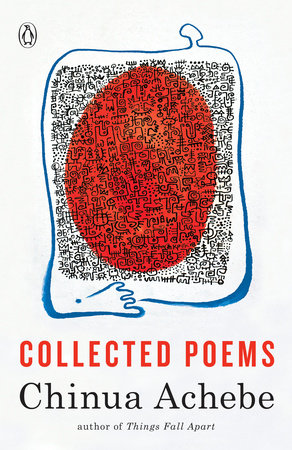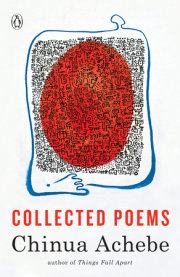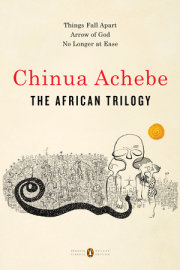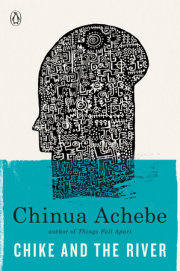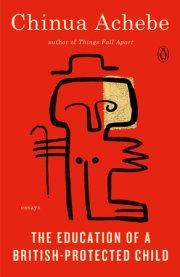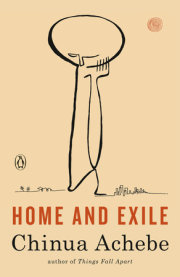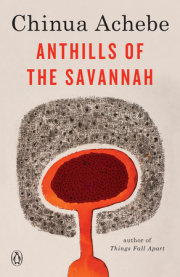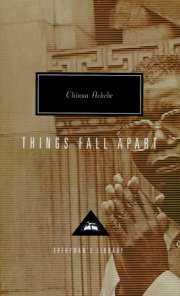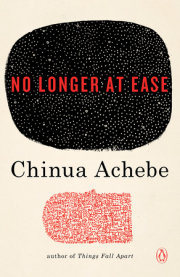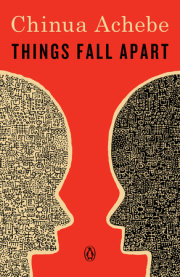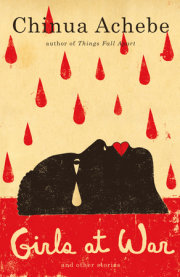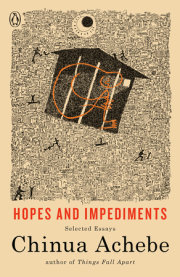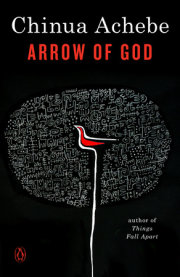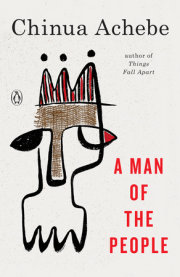Prologue1966absentminded
our thoughtless days
sat at dire controls
and played indolently
slowly downward in remote
subterranean shaft
a diamond-tipped
drill point crept closer
to residual chaos to
rare artesian hatred
that once squirted warm
blood in God's face
confirming His first
disappointment in Eden
Nsukka, November 19, 1971Benin RoadSpeed is violence
Power is violence
Weight violence
The butterfly seeks safety in lightness
In weightless, undulating flight
But at a crossroads where mottled light
From old trees falls on a brash new highway
Our separate errands collide
I come power-packed for two
And the gentle butterfly offers
Itself in bright yellow sacrifice
Upon my hard silicon shield.
Mango SeedlingThrough glass windowpane
Up a modern office block
I saw, two floors below, on wide-jutting
concrete canopy a mango seedling newly sprouted
Purple, two-leafed, standing on its burst
Black yolk. It waved brightly to sun and wind
Between rains-daily regaling itself
On seed yams, prodigally.
For how long?
How long the happy waving
From precipice of rainswept sarcophagus?
How long the feast on remnant flour
At pot bottom?
Perhaps like the widow
Of infinite faith it stood in wait
For the holy man of the forest, shaggy-haired
Powered for eternal replenishment.
Or else it hoped for Old Tortoise's miraculous feast
On one ever recurring dot of cocoyam
Set in a large bowl of green vegetables-
This day beyond fable, beyond faith?
Then I saw it
Poised in courageous impartiality
Between the primordial quarrel of Earth
And Sky striving bravely to sink roots
Into objectivity, midair in stone.
I thought the rain, prime mover
To this enterprise, someday would rise in power
And deliver its ward in delirious waterfall
Toward earth below. But every rainy day
Little playful floods assembled on the slab,
Danced, parted round its feet,
United again, and passed.
It went from purple to sickly green
Before it died.
Today I see it still-
Dry, wire-thin in sun and dust of the dry months-
Headstone on tiny debris of passionate courage.
Aba, 1968Pine Tree in Spring(for Leon Damas)Pine tree
flag bearer
of green memory
across the breach of a desolate hour
Loyal tree
that stood guard
alone in austere emeraldry
over Nature's recumbent standard
Pine tree
lost now in the shade
of traitors decked out flamboyantly
marching back unabashed to the colors they betrayed
Fine tree
erect and trustworthy
what school can teach me
your silent, stubborn fidelity?
The ExplorerLike a dawn unheralded at midnight
it opened abruptly before me-a rough
circular clearing, high cliffs of deep
forest guarding it in amber-tinted spell
A long journey's end it was though how
long and from where seemed unclear,
unimportant; one fact alone mattered
now-that body so well preserved
which on seeing I knew had brought me there
The circumstance of death
was vague but a floating hint
pointed to a disaster in the air
elusively
But where, if so, the litter
of violent wreckage? That rough-edged
gypsum trough bearing it like a dead
chrysalis reposing till now in full
encapsulation was broken by a cool
hand for this lying in state. All else
was in order except the leg missing
neatly at knee joint
even the white schoolboy dress
immaculate in the thin yellow
light; the face in particular
was perfect having caught nor fear
nor agony at the fatal moment.
Clear-sighted with a clarity
rarely encountered in dreams
my Explorer-Self stood a little
distant but somewhat fulfilled; behind
him a long misty quest: unanswered
questions put to sleep needing
no longer to be raised. Enough
in that trapped silence of a freak
dawn to come face-to-face suddenly
with a body I didn't even know
I lost.
Agostinho NetoNeto, were you no more
Than the middle one favored by fortune
In children's riddle; Kwame
Striding ahead to accost
Demons; behind you a laggard third
As yet unnamed, of twisted fingers?
No! Your secure strides
Were hard earned. Your feet
Learned their fierce balance
In violent slopes of humiliation;
Your delicate hands, patiently
Groomed for finest incisions,
Were commandeered brusquely to kill,
Your melodious voice to battle cry.
Perhaps your family and friends
Knew a merry flash cracking the gloom
We see in pictures but I prefer
And will keep the darker legend.
For I have seen how
Half a millennium of alien rape
And murder can stamp a smile
On the vacant face of the fool,
The sinister grin of Africa's idiot-kings
Who oversee in obscene palaces of gold
The butchery of their own people.
Neto, I sing your passing, I,
Timid requisitioner of your vast
Armory's most congenial supply.
What shall I sing? A dirge answering
The gloom? No, I will sing tearful songs
Of joy; I will celebrate
The Man who rode a trinity
Of awesome fates to the cause
Of our trampled race!
Thou Healer, Soldier, and Poet!
Poems About WarThe First Shot
That lone rifle-shot anonymous
in the dark striding chest-high
through a nervous suburb at the break
of our season of thunders will yet
steep its flight and lodge
more firmly than the greater noises
ahead in the forehead of memory.
A Mother in a Refugee CampNo Madonna and Child could touch
Her tenderness for a son
She soon would have to forget. . . .
The air was heavy with odors of diarrhea,
Of unwashed children with washed-out ribs
And dried-up bottoms waddling in labored steps
Behind blown-empty bellies. Other mothers there
Had long ceased to care, but not this one:
She held a ghost-smile between her teeth,
And in her eyes the memory
Of a mother's pride. . . . She had bathed him
And rubbed him down with bare palms.
She took from their bundle of possessions
A broken comb and combed
The rust-colored hair left on his skull
And then-humming in her eyes-began carefully to part it.
In their former life this was perhaps
A little daily act of no consequence
Before his breakfast and school; now she did it
Like putting flowers on a tiny grave.
Christmas in Biafra (1969)This sunken-eyed moment wobbling
down the rocky steepness on broken
bones slowly fearfully to hideous
concourse of gathering sorrows in the valley
will yet become in another year a lost
Christmas irretrievable in the heights
its exploding inferno transmuted
by cosmic distances to the peacefulness
of a cool twinkling star. . . . To death-cells
of that moment came faraway sounds of other
men's carols floating on crackling waves
mocking us. With regret? Hope? Longing? None of
these, strangely, not even despair rather
distilling pure transcendental hate . . .
Beyond the hospital gate
the good nuns had set up a manger
of palms to house a fine plastercast
scene at Bethlehem. The Holy
Family was central, serene, the Child
Jesus plump wise-looking and rose-cheeked; one
of the magi in keeping with legend
a black Othello in sumptuous robes. Other
figures of men and angels stood
at well-appointed distances from
the heart of the divine miracle
and the usual cattle gazed on
in holy wonder. . . .
Poorer than the poor worshippers
before her who had paid their homage
with pitiful offering of new aluminum
coins that few traders would take and
a frayed five-shilling note she only
crossed herself and prayed open-eyed. Her
infant son flat like a dead lizard
on her shoulder his arms and legs
cauterized by famine was a miracle
of its kind. Large sunken eyes
stricken past boredom to a flat
unrecognizing glueyness moped faraway
motionless across her shoulder. . . .
Now her adoration over
she turned him around and pointed
at those pretty figures of God
and angels and men and beasts-
a spectacle to stir the heart
of a child. But all he vouchsafed
was one slow deadpan look of total
unrecognition and he began again
to swivel his enormous head away
to mope as before at his empty distance. . . .
She shrugged her shoulders, crossed
herself again, and took him away.
Air RaidIt comes so quickly
the bird of death
from evil forests of Soviet technology
A man crossing the road
to greet a friend
is much too slow.
His friend cut in halves
has other worries now
than a friendly handshake
at noon.
Biafra, 1969First time Biafra
Was here, we're told, it was a fine
Figure massively hewn in hardwood.
Voracious white ants
Set upon it and ate
Through its huge emplaced feet
To the great heart abandoning
A furrowed, emptied scarecrow.
And sun-stricken waves came and beat crazily
About its feet eaten hollow
Till crashing facedown in a million fragments
It was floated gleefully away
To cold shores-cartographers alone
Marking the coastline
Of that forgotten massive stance.
In our time it came again
In pain and acrid smell
Of powder. And furious wreckers
Emboldened by half a millennium
Of conquest, battening
On new oil dividends, are now
At its black throat squeezing
Blood and lymph down to
Its hands and feet
Bloated by quashiokor.
Must Africa have
To come a third time?
An "If" of HistoryJust think, had Hitler won
his war the mess our history
books would be today. The Americans
flushed by verdict of victory
hanged a Japanese commander for
war crimes. A generation later
an itching finger pokes their ribs:
We've got to hang
our Westmoreland
for bloodier crimes
in Viet Nam!
But everyone by now must
know that hanging takes much more
than a victim no matter his
load of manifest guilt. For even
in lynching a judge of sorts is needed-
a winner. Just think if Hitler
had gambled and won what chaos
the world would have known. His
implacable foe across the Channel
would surely have died for
war crimes. And as for H. Truman,
the Hiroshima villain, well!
Had Hitler won his war
de Gaulle would have needed no
further trial for was he not
condemned already by Paris
to die for his treason
to France? . . . Had Hitler won,
Vidkun Quisling would have kept
his job as Prime Minister
of Norway, simply by
Hitler winning.
Remembrance DayYour proclaimed mourning
your flag at half-mast your
solemn face your smart backward
step and salute at the flowered
foot of empty graves your
glorious words-none, nothing
will their spirit appease. Had they
the choice they would gladly
have worn for you the same
stricken face gladly flown
your droopéd flag spoken
your tremulous eulogy-and
been alive. . . . Admittedly you
suffered too. You lived wretchedly
on all manner of gross fare;
you were tethered to the nervous
precipice day and night; your
groomed hair lost gloss, your
smooth body roundedness. Truly
you suffered much. But now
you have the choice of a dozen
ways to rehabilitate yourself.
Pick any one of them and soon
you will forget the fear
and hardship, the peril
on the edge of the chasm. . . . The
shops stock again a variety
of hair dyes, the lace and
the gold are coming back; so
you will regain lost mirth
and girth and forget. But when,
how soon, will they their death? Long,
long after you forget they turned
newcomers again before the hazards
and rigors of reincarnation, rude
clods once more who once had borne
the finest scarifications of the potter's
delicate hand now squashed back
into primeval mud, they will
remember. Therefore fear them! Fear
their malice your fallen kindred
wronged in death. Fear their blood feud;
tremble for the day of their
visit! Flee! Flee! Flee your
guilt palaces and cities! Flee
lest they come to ransack
your place and find you still
at home at the crossroad hour. Pray
that they return empty-handed
that day to nurse their red-hot
hatred for another long year. . . .
Your glorious words are not
for them nor your proliferation
in a dozen cities of the bronze
heroes of Idumota. . . . Flee! Seek
asylum in distant places till
a new generation of heroes rise
in phalanges behind their purified
child-priest to inaugurate
a season of atonement and rescue
from fingers calloused by heavy deeds
the tender rites of reconciliation
A Wake for OkigboFor whom are we searching?
For whom are we searching?
For Okigbo we are searching!
Nzomalizo!
Has he gone for firewood, let him return.
Has he gone to fetch water, let him return.
Has he gone to the marketplace, let him return.
For Okigbo we are searching.
Nzomalizo!
For whom are we searching?
For whom are we searching?
For Okigbo we are searching!
Nzomalizo!
Has he gone for firewood, may Ugboko not take him.
Has he gone to the stream, may Iyi not swallow him!
Has he gone to the market, then keep from him you
Tumult of the marketplace!
Has he gone to battle,
please Ogbonuke step aside for him!
For Okigbo we are searching!
Nzomalizo!
They bring home a dance, who is to dance it for us?
They bring home a war, who will fight it for us?
The one we call repeatedly,
there's something he alone can do
It is Okigbo we are calling!
Nzomalizo!
Witness the dance, how it arrives
The war, how it has broken out
But the caller of the dance is nowhere to be found
The brave one in battle is nowhere in sight!
Do you not see now that whom we call again
And again, there is something he alone can do?
It is Okigbo we are calling!
Nzomalizo!
The dance ends abruptly
The spirit dancers fold their dance and depart in midday
Rain soaks the stalwart, soaks the two-sided drum!
The flute is broken that elevates the spirit
The music pot shattered that accompanies the leg in
its measure
Brave one of my blood!
Brave one of Igbo land!
Brave one in the middle of so much blood!
Owner of riches in the dwelling place of spirit
Okigbo is the one I am calling!
Nzomalizo!
In memory of the poet Christopher Okigbo (1932-1967)
Translated from the Igbo by Ifeanyi MenkitiAfter a WarAfter a war life catches
desperately at passing
hints of normalcy like
vines entwining a hollow
twig; its famished roots
close on rubble and every
piece of broken glass.
Irritations we used
to curse return to joyous
tables like prodigals home
from the city. . . . The meter man
serving my maiden bill brought
a friendly face to my circle
of sullen strangers and me
smiling gratefully
to the door.
After a war
we clutch at watery
scum pulsating on listless
eddies of our spent
deluge. . . . Convalescent
dancers rising too soon
to rejoin their circle dance
our powerless feet intent
as before but no longer
adept contrive only
half-remembered
eccentric steps.
After years
of pressing death
and dizzy last-hour reprieves
we're glad to dump our fears
and our perilous gains together
in one shallow grave and flee
the same rueful way we came
straight home to haunted revelry.
Christmas 1971
Copyright © 2004 by Chinua Achebe. All rights reserved. No part of this excerpt may be reproduced or reprinted without permission in writing from the publisher.

